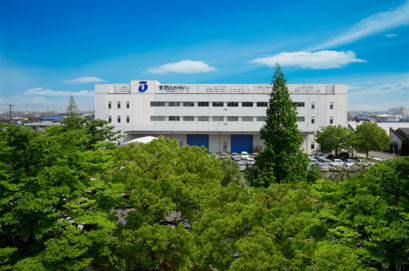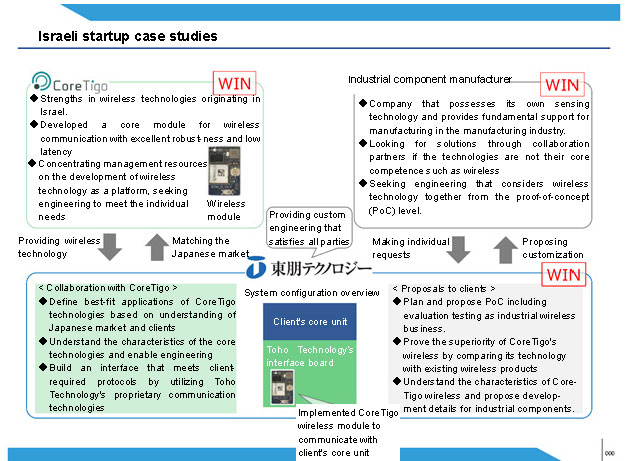Case Studies on Japan-Israel SMEs Collaboration
(2020.11.20)
Toho Technology Corporation
● Background
The origins of Toho Technology Corporation begin back at a Western dry goods and notions retailer named Momijiya that was founded in the latter half of the Edo period 1603-1868AD. Later the current company's predecessor Toa Industries was established in 1932. Using its position as a distributor for Hitachi, Ltd., the company gradually expanded its scale doing business as a trading company. In 1969, Toho Technology launched its automatic control panel business and entered the manufacturing industry.
It has also focused on developing overseas markets from around 2000. Currently, the company enjoys the world's leading market share in manufacturing equipment and inspection equipment related to flat panel displays, semiconductors, and light emitting diodes. Based on its management philosophy of "Ingenuity and dynamism" and with its core competence in measurement and communication technologies, Toho Technology has been expanding its business throughout its main clients, the factories of manufacturing companies in Japan and abroad.

Inazawa Manufacturing Development Headquarters, Toho Technology Corporation
● Collaboration with Israel on new business development
Toho Technology has been involved in several collaborations with US companies from around 2000. The company had adopted a scheme for creating new business by introducing advanced technologies suitable for the needs of Japanese clients from the United States, doing the engineering in-house, and introducing the technologies to the Japanese market. However, when considering management strategies for the future, Toho Technology decided to focus on the Israeli startup ecosystem in order to differentiate itself from other companies. Beginning in 2018, the company started a local technology search in Israel for the purpose of collaborating with Israeli companies. This initiative is largely due to the presence of President Hideyuki Tomita. After graduating from university, Tomita worked for a major trading company where he was engaged in international business. His experiences at that time also likely influenced Toho Technology's active collaboration with overseas companies.
Taking along the business issues obtained by feedback from Toho Technology's clients, President Tomita traveled to Israel and narrowed down the candidates and technologies from about 20 to 30 companies that were presented by local business partners and matched Toho Technology's objectives. From this group of companies, he focused on CoreTigo Ltd., a company that possessed technology that could be expected to have an affinity and synergistic effects with Toho Technology's own business, and with a feeling that the company would be an enthusiastic negotiating partner and motivated to perform in the Asian market. A Japanese consulting firm also provided support for building a partnership with CoreTigo. CoreTigo is an Israeli startup that has strengths in the development of industrial wireless communication and is the world's first company to succeed in developing for the IO-Link Wireless※ standard. Currently, Toho Technology has concluded a collaboration agreement with CoreTigo to develop a system for wireless control of industrial robots in the Japanese and Asian markets.
Toho Technology will import CoreTigo's Wireless IO-Link devices and utilize its own engineering technology cultivated over many years to improve its products to meet the individual needs of its clients. By adding its own advanced engineering to the Israeli startup's advanced technology, the company aims to differentiate its products from those of other companies. Since Toho Technology originally had experience in wireless technology, it was able to introduce a new technology that complemented its own business.

CoreTigo's wireless products
※IO-Link: A digital communication protocol used on-site in factories. IO-Link is specified by an international standard. Robots in factories typically have actuators and sensors that are connected to controllers by wiring, and this entails problems of labor and cost when on-site maintenance is performed. Wireless communication in factories has not become widespread due to the risk of communication interruptions and difficulties with real-time control. The key feature of CoreTigo's wireless communication technology is that it does not break down and does not delay, which means that improvements in industrial control systems can be expected.
● Negotiation mindset when dealing with Israeli companies
Japanese companies generally tend to have a technical interest in "First of all, wanting to make good products." On the other hand, Israeli companies have a strong backcast thinking, such as "First of all, what do we need to do to sell something?" So this difference in approach needs to be resolved by business matching. In addition, negotiations require prompt decision-making. Since Toho Technology had a history of focusing on the Israeli startup ecosystem by President Tomita himself, it was easy to quickly get a go-ahead for contracts and collaborations. In general, the larger the Japanese company, the more complex and likely it is that decision-making will be delayed, and this can be frustrating for Israeli start-ups seeking a fast approach. But conversely, Japanese SMEs that are able to make top-down decisions may find it easier to collaborate with Israeli companies.
・ Mid-sized industrial equipment manufacturer with strengths in engineering, with origins in a dry goods and notions shop founded in the latter half of the Edo period
・ Leveraging its experience in the United States, gathering its clients' needs and exploring technologies in Israel
・ Smooth negotiations with local Israeli companies due to the speed of its decision-making, which is a unique aspect of family-owned companies
● Future outlook
Through its local business partners, Toho Technology is also negotiating to collaborate with several Israeli companies with cutting-edge technology. When requesting the introduction of local companies and products as candidates that might match their business issues, it is important to determine whether the products and technologies of the other party have an affinity with the company's own business and whether the introduction would bring about synergistic effects. That makes it easier to introduce products and technologies that meet the needs of Japanese clients. The enthusiasm and motivation of the negotiating partner are also important points. The seriousness of the other party should also be evaluated in the process of the negotiations and contract, such as whether the owner will be present at the negotiations from the beginning and whether they wish to develop their business in the Asian market. Currently, the company is seeking to expand in the Japanese market by promoting alliances with start-up companies such as Feelit Technologies, which develops monitoring systems for pipe and valve conditions, and InnerEye, which develops image identification systems using brain waves. Although these determined introductions in the Japanese market will be future developments, the fact that Toho Technology has adopted advanced technologies from Israel is itself a door opener for the company's sales activities.

Collaboration with CoreTigo
Company information
Company Name |
Toho Technology Corporation |
President |
Hideyuki Tomita |
Founded |
October 1932 |
Capital |
430 million JPY |
Number of Employees |
700 (total, including group companies) |
Address |
3-10-22 Sakae, Naka-ku, Nagoya-shi, Aichi 460-0008 |
Tel |
052-251-7211 |
Website |
Editor: Center for International Economic Collaboration
← Back to the list
<Related Website>


